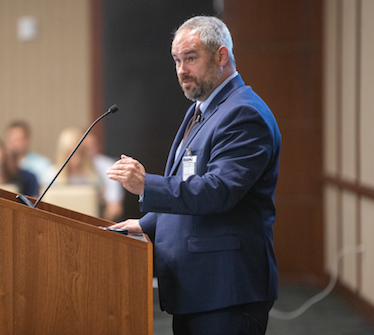

This year’s Healthcare Ethics and Law (HEAL) Institute conference included guest speakers discussing ethical access to care. Topics highlighted in the morning session were philosophy of care for the poor, health care systems and the church, and overall framework for care, while the afternoon session considered a more local and regional approach to these topics.
Hosted by Samford University’s Center for Faith and Health, which is housed in the College of Health Sciences, the HEAL conference is designed to help health care professionals, clergy and health system administrators think about today’s most pressing health care and law issues through presentations and discussions with prominent experts.
Dennis Sansom, HEAL fellow and professor and chair of the philosophy department in Samford’s Howard College of Arts and Sciences, kicked off the day’s activities with a meaningful discussion of the biblical foundations of ethics and caring for the poor. “The church is the moral community within a larger community to offer to care for the poor,” Sansom said.
To continue the morning conversation, Michael K. Gusmano, associate professor in Rutgers University’s School of Public Health and a research scholar at the Hastings Center, discussed the project he codirects called the World Cities Project, which compares health systems in large cities across the world.
The morning session continued with remarks from Keith Parrott, chief executive officer at Brookwood Baptist Health, who discussed the unique perspective of a hospital’s challenges to care. The conversation centered on budgeting, assessment of risk and confrontations faced by most hospital administrations today.
The conference paused mid-day to recognize this year’s recipient of the institute’s Pellegrino Medal. The honor was bestowed upon Daniel Callahan, cofounder and president emeritus of The Hastings Center, who is considered a pioneer in bioethics, a noted author and one of the world’s pre-eminent bioethics scholars. Along with Willard Gaylin, he established The Hastings Center in 1969 as the world’s first bioethics research institute. The center is a nonpartisan, nonprofit organization of research scholars from multiple disciplines, including philosophy, law, political science and education.
Gusmano accepted the award on Callahan’s behalf, reading prepared remarks from Callahan. “The Pellagrino Award has a special place in my life. I’m thankful for this honor and to receive it at Samford solidifies the influence of Alabama in my life,” said Callahan.
The afternoon ended in a spirited conversation led by a distinguished panel of top health care leadership, including Jason Alexander, senior vice president of Ascension Healthcare; Dow Briggs, chief business officer at Blue Cross and Blue Shield of Alabama; Drew Mason, chief executive officer at Grandview Medical Center, Community Health Systems; Keith Parrott, president and chief executive officer of Brookwood Baptist Health; and Mark Wilson, Jefferson County health officer. Discussion centered around rights of care, health care insurance, licensure, health care technology, the future of health care practitioners, prescriptions cost, and health care politics.
